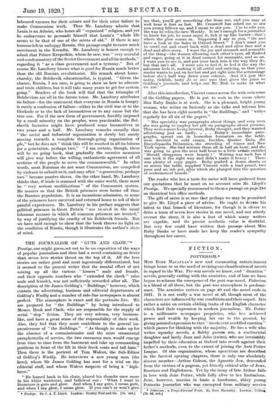THE JOURNALISM OF " GUTS AND GLOW."*
Prestige, one might guess, set out to be an exposition of the ways of popular journalism and then had a novel containing no fewer than seven love stories thrust on the top of it. All the love stories are rather good and most ingeniously differentiated, but it seemed to the present writer that the mental effort of not mixing up all the various " kissers " male and female,
and their opposite numbers who " extended the cheek " (also male and female), was not sufficiently rewarded after all. The description of Sir James Golding's " Buildings," however, which contain the advertising, business and editorial departments of
Golding's Weekly and a number of side-line newspapers is almost perfect. The atmosphere is exact and the portraits live. We
are prepared for " the Buildings " by being introduced to Messrs. Husk and Clack, who are responsible for the supply of serial " slop " fiction. They are very solemn, very business- like, and have a great sense of the responsibility of their work. Also, they feel that they must contribute to the general im-
pressiveness of " the Buildings." " As though to make up for the absence of a commissionaire and the more ornamental paraphernalia of service, the two enormous men would emerge from time to time from the basement and take up commanding positions in front of the lift in their frock coats and tall hats." Then there is the portrait of Tom Walcot, the Sub-Editor of Golding's Weekly. He interviews a new young man (the hero), whom Sir James Golding has sent for a trial on the editorial staff, and whom Walcot suspects of being a " high- brow."
" He leaned back in his chair, placed his thumbs once more in his white waistcoat, and bellowed out : ' What I want in literature is guts and glow. And when I say guts, I mean guts, and when I say glow, I mean glow. If you can't or won't give * Prestige. By J. t. T. Lloyd. London : Stanley Paul and Co. f7s. net.] me that, you'll get something else from me, and you may as well hear it first as last. Mr. Cresswell has asked me to stir you young fellows up, and I mean to stir you. Pm to edit you, the way he edits the new Weekly. It isn't enough for a journalist to know his job, ho must enjoy it, lick it up liko butter—that's where the glow comes in. Supposing I say to you, " Go and have a look at the Sales in Oxford Street." I don't want you to crawl out and crawl back with a dead and alive face and a dead and alive story. I want the joy and stomach and scramble of the thing—the women elbowing each other's eyes, all flushed and eager, going at it in dead earnest for remnants, and so on. I want you to see it, and put your back into it the way they do, but that isn't all. I want you to feel it, to feel it the way the salesman feels it, making it all artful and enticing, so that your reader wants to put on her hat and get right into the scrummage before she's half way down your column. And it's just this natty, ticklish, tasty Je ne sais quoi that gives the juice to Golding's journals, and helps our Mr. Bish to make us what we are.' "
After this introduction, Vincent comes across the writs rain some of the Golding papers. He is put to wait in the room where Miss Ruby Banks is at work. She is a pleasant, bright young woman, who writes on furiously as she talks and informs him that she has been eight months in "the Buildings," and "writes regularly for all six of the papers."
" Her speciality was paragraphs about things, and very soon she was going to employ her gift on paragraphs about persons. They were a more living interest, Ruby thought, and they wanted advertising just as badly. . . . Ruby's immediate para- graphs, spread out in horseshoe formation on the table, were devoted to cold cream, freckles, Quaker Oats, the Encyclopaedia Britannica, the crowding of trams and New York opera. She had written them all in half an hour, and she was going to give the next half hour to a little article entitled ' Should clergymen wear beards i ' Writing was such fun if one took it the right way and didn't make it heavy ! There was plenty of copy paper. Ruby pushed a dozen sheets or so across the table, supplied Vincent with a lead pencil, two pens and an ink pot, after which she plunged into the question of ecclesiastical beards."
The reader who has a taste for satire will have gathered from our quotations that he must on no account miss Mr. Lloyd's Prestige. We specially recommend to them a passage on page 248 on theatrical box office methods.
The gift of satire is so rare that perhaps we may be permitted to give Mr. Lloyd a piece of advice. He ought to devote his talent to that branch of literature, for though it is clever to drive a team of seven love stories in one novel, and not utterly overset the story, it is also a feat of which many writers are capable, and its precise aesthetic value is doubtful. But very few could have written that passage about Miss Ruby Banks or have made her keep the reader's sympathy throughout her career.






































 Previous page
Previous page